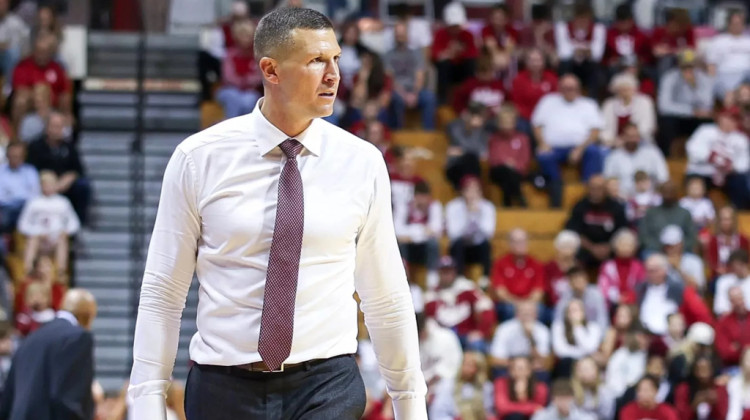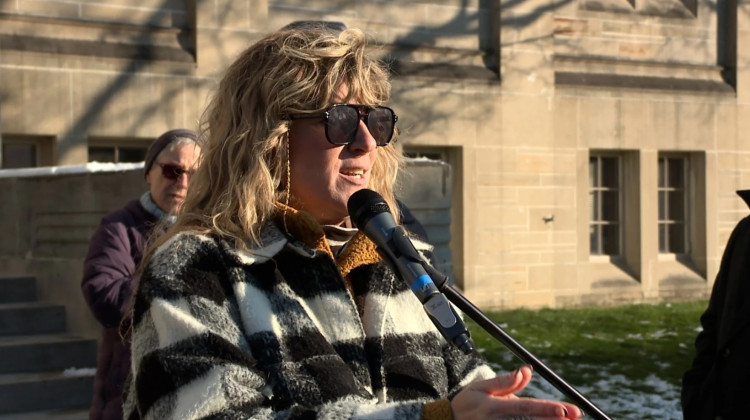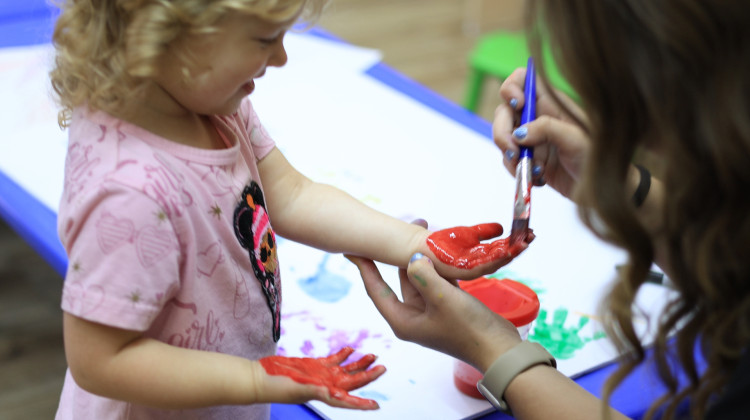
Mitchell Bridwell types on a Perkins Unimanual Brailler in the kitchen of his Pittsboro home as his mother Marta stands in the back, on Wednesday, June 14, 2017. Bridwell, 16, is one of 10 students from the U.S. and Canada to compete in the national Braille Challenge for his age group in Los Angeles on June 17, 2017.
Eric Weddle/WFYI Public MediaMitchell Bridwell is a voracious reader.
The Pittsboro teen made his way through some Charles Dickens but would rather spend time inside the worlds of Rick Riordan or J. K. Rowling.
To make it through Harry Potter and the Prisoner of Azkaban, he’ll have to run his fingertips through six volumes of the braille edition.
But for Mitchell, he’d much rather dig into modern fiction by over smoothly running his fingertips over tiny dots of punctured paper than listening to any audio book or voiceover software.
“I’m not sure if je ne sais quoi would be the right word, but I think that works for braille,” he says while sitting on his couch.
It’s safe to say that Bridwell’s braille reading skills are known nationally. This weekend, he’ll join three other students from the Indiana School for the Blind and Visually Impaired to compete at the national Braille Challenge contest in Los Angeles.
To get there, the four beat out 1,100 braille readers and writers in preliminary regional events across the US and Canada. Only 50 students, ages six to 19, made the finals.
In braille — words and letters are formed within units of space known as braille cells. A full braille cell is two parallel rows of three raised dots.
Bridwell starting learning how to read these dots when he was just four years-old.
“I was born blind with persistent hyperplastic primary vitreous – long name,” he says.
It’s rare congenital developmental condition that occurs during fetal development. As Bridwell explains it, when was in the womb, his “blood vessels grew incorrectly and left scar tissues,” that left him blind.
Bridwell just finished his sophomore year playing piano in the school’s jazz band for graduation ceremonies.
This week, he was focused on training for the national Braille Challenge. Bridwell’s just one of ten finalists in his age group.
There are five categories: Reading comprehension; chart and graph reading (such as like answering questions about NASDAQ charts); spelling; proofreading; and something a little noisy.
Contestants will use a six-button brailler machine to pound a transcription of a speaker’s voice into braille. It’s kinda like a typewriter but louder with clinks and clacks resonating as the pins pucnture paper to make braille cells. They’ll be judged on speed and accuracy.
After eight times as a national finalist, Bridwell has his own strategies on how to compete. One of them– he brings his own headphones to block out the brailler machine’s metal clacking and dings.
“He won the very first year when we went to the nationals, he was a third grader,” says Marta Bridwell, his mother. “But after that, the following year, he didn’t do as well. He was very disappointed. He came home with a determination.”
But the competition is more than just a goal to win, she says.
“He has developed perseverance through this,” she says. “Determination. He gets to see that motivation, hard work pays off.”
The Braille Challenge began in Los Angeles 17 years ago out of a concern about high unemployment among the blind and a decline in braille literacy, says Sergio Oliva, Braille Institute national program director.
Back then, unemployment rates were around 75 percent. But research found that nearly all of those who had jobs, could read braille.
“There was a correlation to employment and braille literacy,” Oliva says. “And that is why we started the challenge — to promote braille literacy.”
Today, unemployment among working-age blind adults is 70 percent, according to the National Federation of the Blind. The organization also reports there are 93,600 blind or visually impaired school-agee children in the U.S.
“But why aren’t there more blind and the visually impaired going to college?” He says.
In K-12 schools, he says, students have an IEP, or Individualized Education Program. That’s a plan for how and what the student will learn during a time period.
“Once you leave the 12th grade there is no group who sits around and thinks about your goals,” Oliva says. “We want students and families to start thinking now about a post-high-school plan.”
So the Braille Challenge added a new focus, getting more blind students into higher education. To help get that conversation started, the competition will be held at the University of Southern California for the first time.
Students will have a chance to experience college and ask questions about life and learning on a campus.
That excited Bridwell. He’s already thinking about college and a job after — maybe something in sound design or working digital access issues for the blind. But first, he’ll have to figure out a few things.
“[I] will need to know how to get around my college,” he laughs. “How to organize my dorm room,”
But Bridwell is mainly ready to compete.
“I have mentally matured from this experience. The first time I didn’t do well and I was very sad. But now, I just have to strive. And I really hope I get first — not saying that is going to happen,” he says. “But I am going to give it my all.”
Winners will be announced Saturday night.
The other Indiana students competing are: Ian Receveur, of Georgetown; May Resendiz of Avon; and Kaylei Carie of Dubois.
Contact WFYI education reporter Eric Weddle at eweddle@wfyi.org or call (317) 614-0470. Follow on Twitter: @ericweddle.
 DONATE
DONATE







 Support WFYI. We can't do it without you.
Support WFYI. We can't do it without you.